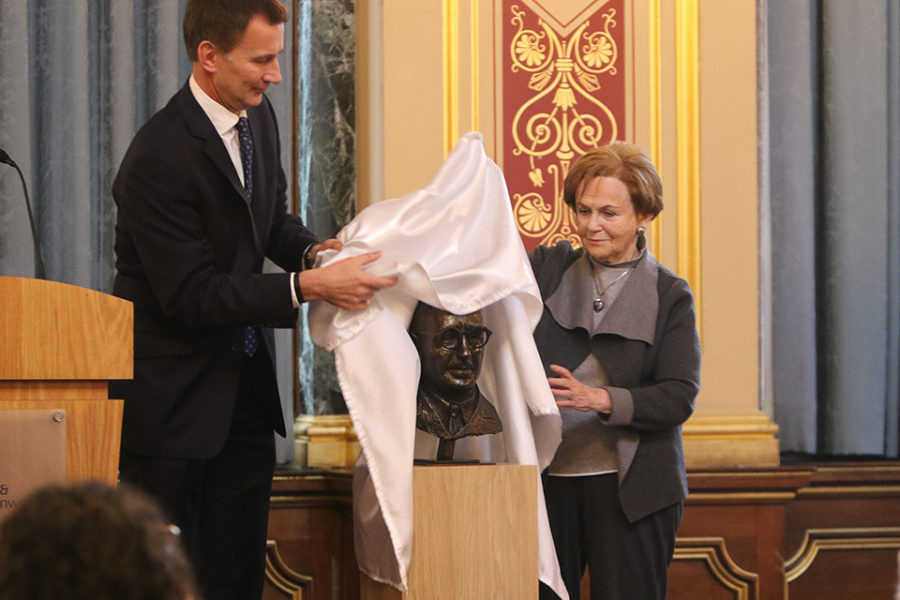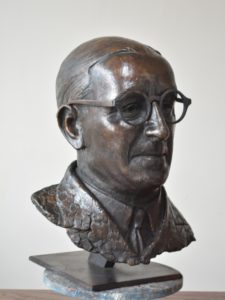23rd January 2019
The spy who saved 10,000 Jews

I have been lucky enough to meet two of my heroes. The first was Nicholas Winton. In the days of single TV households I often found myself watching a programme I didn’t particularly like; That’s Life was one of them. But it launched the career of Victoria Wood and occasionally featured interesting stories, so I tolerated my parents’ Sunday night choice of viewing. One episode still makes me cry when I see it on YouTube (it’s the top hit when you type Nicholas Winton Esther Rantzen into a Google search).
Nicholas Winton’s wife had found a ledger in their attic and sent it to Rantzen. The ledger contained the names of hundreds of Jewish children who Nicholas had brought out of Prague in 1939. Mrs Winton thought her husband deserved recognition for his actions. Sitting in the TV studio, Nicholas looked as if he’d prefer the ground to swallow him rather than endure the fuss, but the fuss made compelling TV. Rantzen told the story of Vera Gissing, rescued as a child, a woman who had never met her rescuer. Vera was overwhelmed when Rantzen said that her rescuer was the bespectacled man sinking into the seat beside her. The camera then pulled back as Rantzen asked if there was anyone else in the audience who owed their life to Nicholas Winton. It was his turn to be overwhelmed when a whole section of the audience stood up.
Twenty years later, when I met Nicholas in Tel Aviv, I asked him why he had not told his wife and children about what he’d done before the war. He replied quite simply that he’d always been more conscious of the lives he had failed to save. The biggest Kindertransport he organised had been due to leave Prague on 3 September 1939 but was stopped by the outbreak of war; it would have carried more children to safety than all his previous efforts put together. As it was he’d been able to save “only” 666 children.

Captain Francis (Frank) Foley was a similarly modest man. His achievements came to light a decade after Nicholas’s TV appearance, in a book by Michael Smith. He had a further reason for discretion: he was a spy. Born in 1884, the son of an engine fitter for the Great Western Raikway, Frank seemed destined for the priesthood after his mother despatched him aged 14 to a Jesuit seminary in France. Instead he joined MI6, who posted him to Berlin. In the 1930s, he used his cover as Vice Consul to issue visas for thousands of European Jews seeking to flee the Nazis.
Visa rules at the time were stringent: applicants needed to prove they had £1,000 to support themselves. Given the severity of the threat, Frank applied the rules with compassionate imagination. He would accept payments of £10 on the grounds that £990 would somehow magically appear once the refugee disembarked in the port of Haifa in Israel. When people said they had no money at all, he would hint that a friend might write them a letter promising them £1,000. And when he found out about illegal Zionist operations to smuggle Jews from Germany to Palestine, Foley kept quiet, instead of telling his superiors as the (British) rules decreed.
Foley pressed on, going as far as helping Jews to obtain forged passports and visas, even hiding some of them in his own Berlin apartment. His nephew, who visited in 1934, told Michael Smith how, “There would be this knock on the door at two or three o’clock in the morning and we would hear Frank go downstairs to talk to them.” Frank’s wife Kay recalled how the strain and the terrible stories of persecution he was hearing pushed him to the point where “he felt he could go on no longer”. By the time Foley left Berlin in 1939 the British passport control office in the Consulate building on Tiergartenstrasse was attracting queues of 250-300 people at a time, some had come from as far away as Austria or Hungary.

When war broke out and Foley left Germany, he left behind a thick wad of already-approved visas for distribution to people in need. Many never met the man who saved them; many were never even expecting salvation. One Sunday morning, out of the blue, Werner Lachs received a letter from the British Passport Control Office. Werner was 12 years old in 1939; he escaped to Britain and lived to become a 91-year-old great-grandfather-of-four. Like many others rescued by Foley, he spent decades thinking he owed his life to a curious administrative mix-up in the British passport office.
Frank Foley retired in 1949 and died, aged 73, in 1958. His death excited little public interest beyond a few admiring letters in the Daily Telegaph. Recognition came decades later with the publication of Michael Smith’s book, Foley: the Spy Who Saved 10,000 Jews.
On 23 November 2004, the 120th anniversary of his birth, a plaque was unveiled in his memory at the British Embassy in Berlin. I confess it was several years after my arrival at the Embassy in 2010 before I spotted the modest plaque on a pillar in the courtyard. It seemed to me he deserved a more prominent memorial.
Last year Ian Austin MP asked me if I would support his plan to erect a statue in Stourbridge, where Frank is buried in Ian’s constituency. Ian is the adoptive son of two people Frank rescued. I said yes and asked if the FCO could have a second copy of the sculpture. Today the Foreign Secretary unveiled the statue to mark International Holocaust Remembrance Day. At last Frank Foley will get the permanent memorial his work deserves in the heart of the Foreign Office, his apparent employer for all his career.

thanks for sharing such an informative post. Keep sharing posts like this.
Dear Sir,
I am in remembrance of that generation of men and women who recognized Nazism’s danger,and fought. Greatly humbled by the work you do in the past and today.
Indeed a marvellous and brave man!
Dear Sir Simon
Thank you so much for this tribute to a wonderful man and for the help it gives in getting his name better known.
Michael Smith